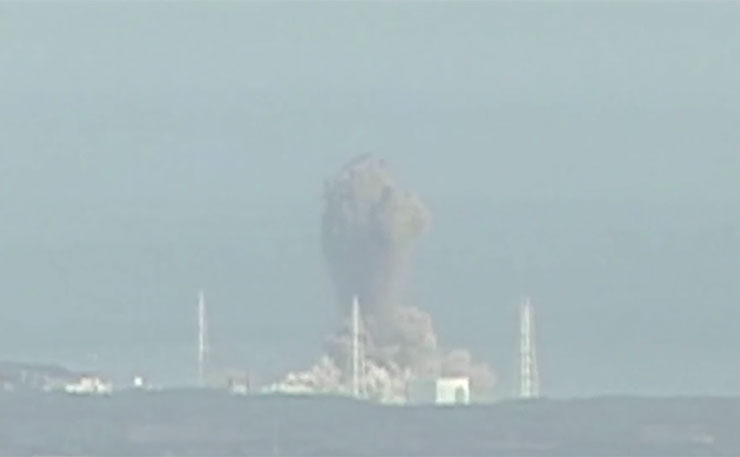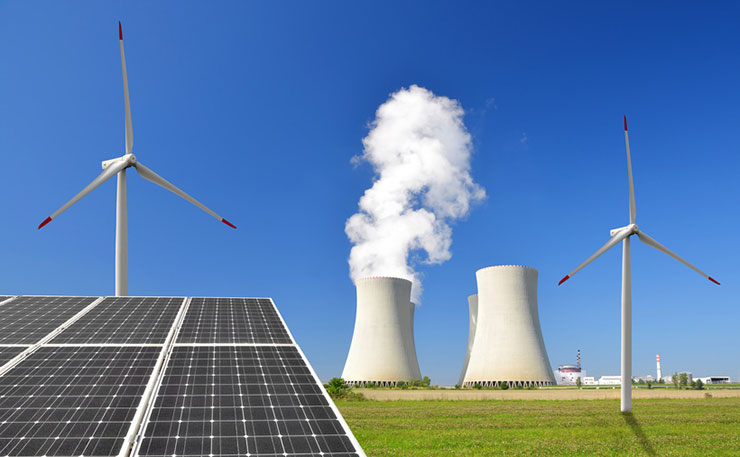Australia does not have a nuclear future, writes Margaret Beavis.
Geoff Russell’s article this week spruiking new nuclear power as a solution for Australia’s woeful carbon emissions mentions Greens policy and then spends a lot of time personally attacking Greens leader Richard DiNatale. It is often a sign of a weak argument when people spend most of their time “playing the man and not the ball”.
The Paris agreement demonstrates widespread international support for limiting emissions. But Australia’s pledges fall a long way short. Nuclear enthusiasts promote new nuclear power as the answer to Australia’s emission reduction. This ignores the lived reality of building nuclear power plants.
Nuclear power has a number of major problems that need to be resolved before Australia takes any steps to commission a nuclear reactor.
Nuclear power is too slow. In Australia, according timelines provided for new plants by the International Atomic Energy Agency, new nuclear power will take well over a decade, and realistically more than two decades to begin to produce power, given the likelihood of civil objections. Building reactors requires a lot of concrete and is very emissions intense, so it will take even longer to repay the carbon emissions from construction.
Nuclear power is too expensive. Two recent independent analyses, one by investment bank Lazard and one a collaborative effort from more than 40 organisations, (including the CSIRO, ARENA, the federal government’s Department of Industry and Science and the Office of the Chief Economist) find nuclear power is significantly expensive when compared to other current power sources.
Past reactors have required massive government subsidies, uncompetitive pricing and loan guarantees. For example in the UK, the Hinkley Point C reactors will require between 4.8 and 17.6 billion pounds subsidy, with electricity prices guaranteed at more than twice the current wholesale rate.
In the USA, $12.5 billion in taxpayer backed loan guarantees have been required to encourage the building of new nuclear power plants. Cost blow-outs are common and almost uniformly there are major delays in construction.
Nuclear power has a significant “opportunity cost”, as it will delay full engagement with renewables. Developing the nuclear industry will, of necessity, redirect funds, energy and expertise to this unsustainable, highly complex industry. This will compromise the effort and resources needed to transition energy production towards renewable/sustainable technologies.
Nuclear power has a long history of accidents and risk of deliberate harm. The nuclear industry worldwide has an extensive and well documented record of errors and accidents leading to toxicity to humans and the environment.

Reactors are also potential targets for extremist groups. It is also extremely difficult to prevent is deliberate sabotage by operating staff or others. There have been a number of airline mass deaths due to deliberate pilot decisions, presumed to be due to mental illness. Reactor staff are not immune from psychological disturbance.
Low dose radiation has clear evidence of health risks. All phases of the nuclear fuel chain: mining and milling, reactor operations, transportation, storage, and disposal of waste involve radiation exposures, with increased risk of malignancies and cardiovascular disease.
Significantly increased rates of childhood leukemia have been found near reactors in Germany and France. The health costs are much greater than with energy technologies such as wind and solar.
Nuclear power waste needs storage for millennia. After billions of dollars and more than six decades spent on research, there is still no long-term solution for the wastes from nuclear reactors. Decades of industry promises of commercial reactors that will use waste as fuel have failed. International research reactors using waste have proved hazardous, expensive and unreliable.
The latest claims about fusion reactors (that they will be powered with waste from past generation reactors) follow many unfulfilled promises of breakthroughs.
Nuclear power generators increase the risk of nuclear weapons proliferation. The majority of nuclear weapons states have acquired their weapons whilst claiming they are using nuclear power for peaceful purposes.
Any reactor construction will lead to accumulation of fissile material (in high level waste) by Australia. This will have regional impacts with perceptions of proliferation risk by our neighbouring countries, which over time may develop into a nuclear arms race. Clearly this is a highly undesirable outcome.
In conclusion, renewable energy sources are much more rapidly deployable, cheaper, create more employment, use less water. In addition they do not create major intergenerational toxic waste, weapons proliferation nor risk nuclear catastrophes such as Chernobyl and Fukushima.
Developing the nuclear fuel industry from scratch in Australia would constitute a significant barrier to dealing with global warming. This is especially clear in the context of our bounteous renewable sources of energy with its minimal health costs, our constrained public financial resources, and the major problems associated with nuclear energy generation.
If we are going to aim for 1.5 degrees we need to act fast, and new nuclear power (to quote The Economist magazine) is a dream that has failed.
Donate To New Matilda
New Matilda is a small, independent media outlet. We survive through reader contributions, and never losing a lawsuit. If you got something from this article, giving something back helps us to continue speaking truth to power. Every little bit counts.





